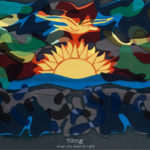One of the most enriching, forward-thinking, fastest-growing online creative communities flourishing right now is the Poetry community, especially in those scenes that center on marginalized voices — Women, POC, Neurodivergent, and LGBTQ. Poetry Spotlight is a feature aiming to showcase the work of some of the most talented creators we’ve discovered making waves on the Internet literary circles, inside or outside the mainstream. This installment is dedicated to the work of Sneha Subramanian Kanta.
Sneha is a GREAT scholarship awardee and has earned a second postgraduate degree in literature from England. She is the founding editor of Parentheses Journal and author of Synecdoche (The Poetry Annals) and Prosopopoeia (Ghost City Press). An old soul, she co-runs a bakery and often hugs horses.
In a bombed city a Woman says Daughter for the first time
In hell, they’re having a vanity fair.
In a recently bombed city, I pray
in a church built of wooden pillars—
& watch a woman give birth
the umbilical cord cut just like that,
like love grows & moves on
in blockbuster romantic movies
as the precision of a surgeon with a knife.
They have brought bread & water
in the name of the Lord, in his name
for all of us taking shelter in his inn.
Pardon me, Lord, but tell me if you are
a woman left on the brink of an ocean
looking out at birds, left to your solitude.
In a bombed city, a woman
says daughter for the first time.
I look at the face of the new mother—
every daughter is a gospel to her mother
& perhaps she thinks of an education
& good clothes & a good wedding for her
though the world has barely said its welcome.
We say Amen & break bread
ignoring fresh explosions heard outside—
Let us remember home is where we
spend nights being protected inside
its drying amniotic until the sun births anew.
Some believe in hell but those that
know earth well can’t tell the difference.
Eve
They’ve stuck nails into her on all four dimensions. The kind that makes you go back to your childhood and replay the same feeling as being knocked out after seeing a barge of colors through a broken mirror. Or the rainbow & the pain of cutting grass after rain. That’s what the world does best—makes you a metaphor. But you ask why you suffer. Your brown skin latches onto the verandah wood. The skies burst open & wash all blood eventually—year after year after year. It was all there in your history & mythology textbooks—when Ram left with Sita for vanvas & kept her solitary, or when your next door neighbor was murdered for being brown in a white town. A century on, they still try to teach you where to draw the line—no apples, no transcendence. So you sit by the windowpane & ask why the sky has been gray. You don’t realize you have begun to resist. Sometimes, a fluttering in your heart, a gentle nudge to become a blackbird & sing. They have taken so much from the world & now they want to take some more from you, too. But you have learnt that trick, of giving most & hiding some for yourself within pleats of your saree, to say that the night is thick and dark and upon us, go to sleep. You go back to the windowpane & look at constellations through city lights that shimmer like galaxies tremble in the cold space between matter & universe. The voyage to elsewhere.
At night a bird perched on my window
and chirped. Restless, indignant fellow roaming rims of night
tides surge and cascade, plummet. Nobody will say four a.m. is the
time to expect birds in winter, on the longest night of the year.
It’s not as though tsuris arrived just now amid white noise
my bones crack with the weight of toil as the feral creature
basks in a swathe where I listen to the hymns of birdsong
far across the land I sense poppies unbutton before dawn dew.
The spirit flows away into a reserve in evanescence as night
slowly softens into day, emptying earth of stray noises,
the pastoral highlights: cattle, tractor engines, farmers tilling lands
as a crimson shaped orb overwrites color on fronds
small fishes in the river have been stealing silver from the moon.
[“In a bombed city a Woman says Daughter for the first time” was originally published in Porridge Magazine; “Eve” was first published in Panoply; “At night a bird perched on my window” first appeared in BOMBUS Press]




